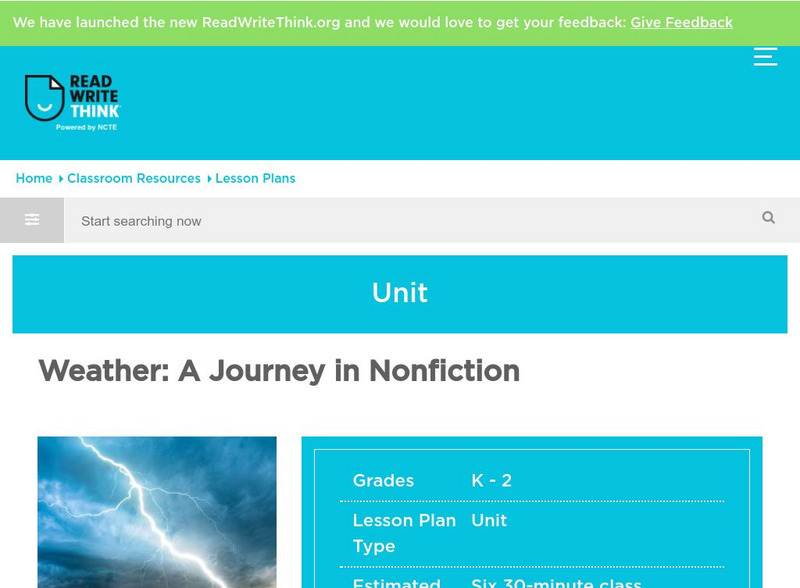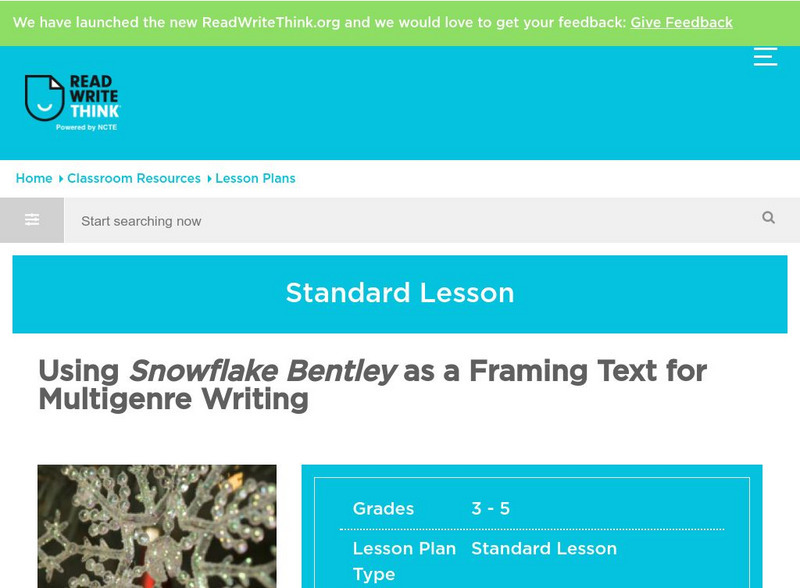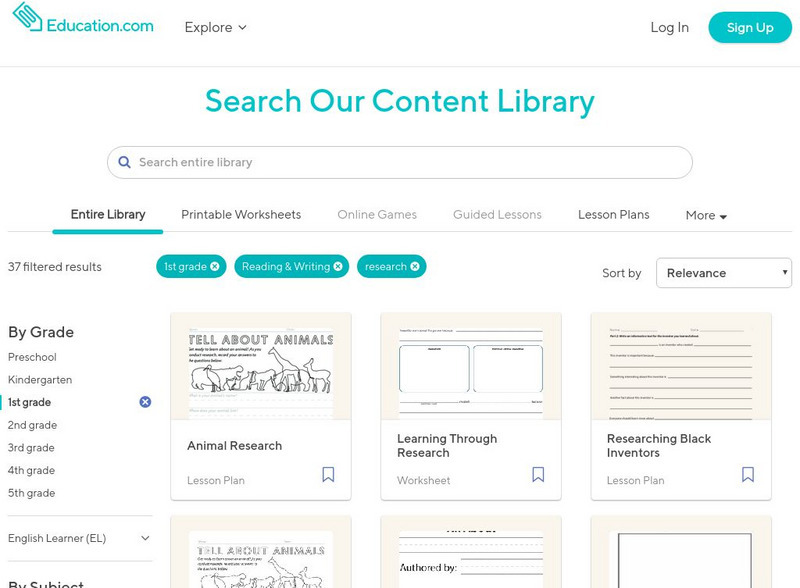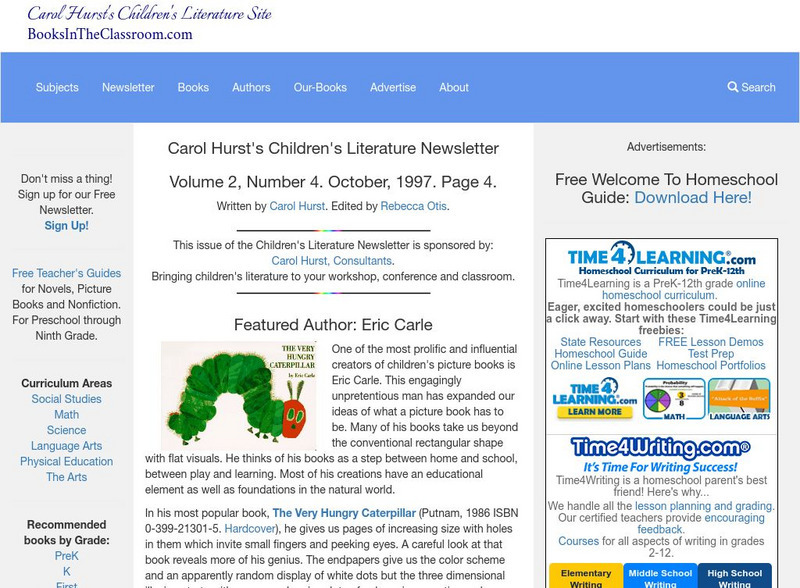Hi, what do you want to do?
ReadWriteThink
Read Write Think: Weather: A Journey in Nonfiction
Questions about weather clear up when students use what they learned from their books to create a presentation to share with the rest of the class.
ReadWriteThink
Read Write Think: Using Snowflake Bentley as a Framing Text for Multigenre Writing
Using Snowflake Bentley as a model, students create a working definition of multigenre text and then use that definition to create their own multigenre piece about winter or another theme.
Writing Fix
Writing Fix: Snowball Note Making and Summarizing
In this lesson, students will engage in this post-reading strategy for a nonfiction or a fiction piece. Each student will take notes on a four-square square graphic organizer about something they already knew, something they found...
Education.com
Education.com: 1st Grade Reading & Writing Resources
[Free Registration/Login Required] This collection of first grade reading and writing resources contains lesson plans and worksheets that can be used during the research process.
ReadWriteThink
Read Write Think: Using Technology to Analyze and Illustrate Symbolism in Night
Images have power-they can trigger memories or symbolize abstract ideas. Middle schoolers put the power of images to the test as they analyze symbolism in Night and create symbolic photomontages.
ReadWriteThink
Read Write Think: Using Comprehension Strategies With Elie Wiesel's Night
Working in small groups, students read and discuss Elie Wiesel's memoir Night and then take turns assuming the "teacher" role, as the class works with four different comprehension strategies.RI.11-12.4 Word meaning, RI.11-12.10b Text...
Utah Education Network
Uen: Cloud, Rain, and Fog
During these three days of lessons, 2nd graders will learn about weather from the nonfiction text by asking questions, and focusing on the text features of the book.
Beacon Learning Center
Beacon Learning Center: Web Lesson: Get the Idea
Read through a lesson about main ideas and supporting details to understand their importance. Practice choosing the main idea of three nonfiction paragraphs. Features practice activities to enhance learning.
E Reading Worksheets
E Reading Worksheets: Summarizing Worksheets and Activities
In this instructional resource, students will learn more about summarizing texts. Worksheets and PowerPoint lessons are provided to reinforce understanding about ways to summarize nonfiction texts and to identify main ideas. This module...
Alabama Learning Exchange
Alex: Introduction to the Dewey Decimal System
This lesson introduces the Dewey Decimal System of numbering used for arranging nonfiction books on the shelves of an elementary school library.
ReadWriteThink
Read Write Think: Exploring Cross Age Tutoring Activities With Lewis and Clark
Interaction and adventure draws high school and elementary school students together as they analyze stories about the Lewis and Clark expedition.
Georgia Department of Education
Ga Virtual Learning: Anglo Saxon Literature
This lesson focuses on Anglo-Saxon Literature including the importance of the monks who listened to the stories and poems and wrote them down and the two nonfiction pieces that had an impact on creation of the written language: The...
Science Education Resource Center at Carleton College
Serc: Written Assignment Sessions
In this lesson, students read a scientific article, answer a quiz about it, then write a summary.
Alabama Learning Exchange
Alex: Exploring Owls
During this instructional activity, students will visit Internet sites to research facts about owls and food chains. They will use this information to complete a picture of an owl food chain, dissect owl pellets, and write a class book...
Alabama Learning Exchange
Alex: My Book About Animals
This lesson will allow students an opportunity to create a book about the different characteristics of mammals, birds, fish, reptiles, and insects. This lesson can be used as a wrap-up project for a unit on animals. This is a fun way for...
Alabama Learning Exchange
Alex: Vocabulary Magic
Using the book Farmer Duck, this instructional activity will take words that are unknown to students and teach students how to determine their meanings. This will help open up the world of reading to students.
Books in the Classroom
Carol Hurst's Children's Literature Site: Eric Carle
What do you know about Eric Carle, the author? This Carol Hurst site highlights some interesting facts about this author's life and refers to some of his books.
EL Education
El Education: Tools for Sailors Ahoy, Mate!
In this lesson students learn about sailing and contribute writing, illustrations, and photographs to a class book containing information about navigation equipment, the Beaufort Scale, knots, and the signal system of flags used by...
Sophia Learning
Sophia: Classification Papers: Key Elements
This lesson goes over words, phrases, and key elements that are included in classification papers.
CPALMS
Cpalms: Exploring the Future of Nasa
[Free Registration/Login Required] In this lesson plan, 8th graders analyze two nonfiction articles and a short video that look at NASA, changes to the space shuttle program, and future possibilities in the United States space program....
Texas Education Agency
Texas Gateway: Hyperbole and Understatement (English Ii Reading)
[Accessible by TX Educators. Free Registration/Login Required] In this lesson, you will learn to recognize hyperbole and understatement in nonfiction. Good examples also appear in other forms of writing such as fiction and poetry, but we...
Polk Brothers Foundation Center for Urban Education at DePaul University
De Paul University: Center for Urban Education: What Is a Fable? [Pdf]
"What is a Fable?" is a one page, nonfiction passage about what a fable is including animals that talk and a lesson learned. It is followed by an open-ended question which requires students to provide evidence from the story; it includes...

























